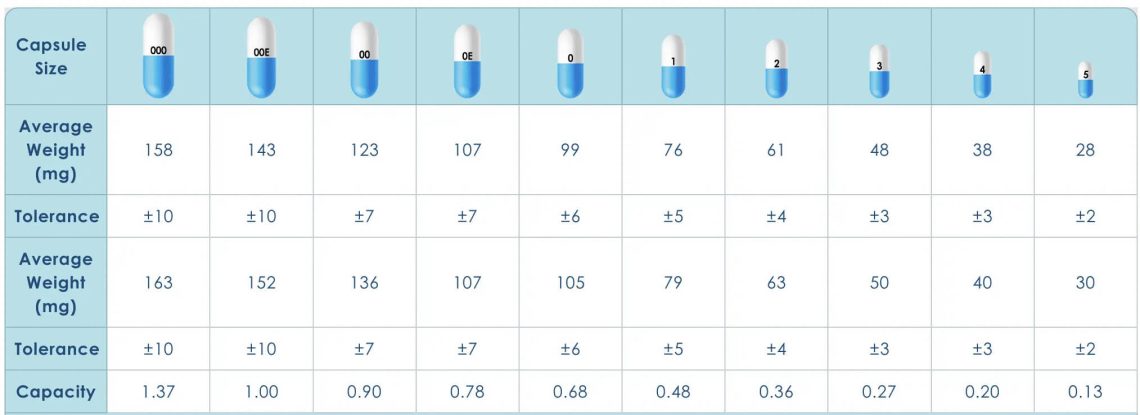Making your own supplements can be a very fulfilling process that allows you to customize your fitness regimen to meet your specific needs. Choosing the right capsule size chart is an important step in this process, regardless of whether you’re starting out in the supplement industry or creating DIY supplements. The first step to creating a successful supplement is being aware of the variety of capsule sizes that are available.
Table of Contents
Deciphering Capsule Sizes
At first, the variety of capsule sizes may seem confusing. There are many options, ranging from the small “5” to the much larger “000”. Each size is designed to hold a specific amount of ingredients, expressed in milligrams. The end-user’sabilityto swallow the product easily and the amount of ingredients that must fit inside must be taken into account during the selection process. It all comes down to striking the right balance between dosage requirements and comfort. The secret is to identify your needs and those of your target market.
To put this into context, a size “5” capsule can only hold approximately 65 mg of material, whereas a size “000” capsule can hold roughly 1000 mg. When choosing your ingredients and their amounts, it’s critical to be aware of these capacities. Underfilling a capsule can result in wasted space and uneven dosing, while overfilling can make it difficult to close and possibly spill. Finding the ideal balance is essential to creating supplements that work.
Finding the Right Balance
Selecting the most suitable size according to the capsule size chart involves a careful evaluation of your supplement’s components. The core challenge lies in approximating the volume of your ingredients and aligning this with a fitting capsule size. Some ingredients are denser and might necessitate a larger capsule, or the addition of fillers could be required to achieve the desired dosage. Initial trials might require some adjustments, but they are critical in ensuring the selection of an ideal size for your supplement mixture.
Finding the total weight of your ingredients per dose is a good place to start. This will provide you with a starting point for choosing the size of your capsule. Don’t forget to take into consideration any excipients or fillers you might need to use in order to get the right dosage. It’s a good idea to think about your ingredient density as well. While some powders are heavier and more compact, others are lighter and more voluminous. This may have a major effect on how much room they occupy inside the capsule.
Considerations for Intended Use
The demographic you want to reach with your capsule is a key consideration. Smaller sizes of supplements intended for elderly or pediatric patients may be the best option to prevent swallowing issues. On the other hand, larger sizes might be more useful for adult users—particularly for supplements that require a higher dose of active ingredients. Making decisions based on the intended use will help you make sure your product is usable and accessible to the people for whom it is designed.
It’s important to take into account how many capsules you anticipate your users taking each day. Larger sizes might be preferable if your supplement calls for more than one capsule per dose in order to minimize the quantity of capsules required. On the other hand, smaller capsules might be more practical and easier to swallow if your supplement is meant to be taken several times a day. You can choose the ideal capsule size for your product by considering the user’s experience.
Importance of Capsule Material
The capsule’s composition holds equal significance to its dimensions. Because they are so inexpensive, gelatin capsules are widely used, but not everyone can use them due to allergies or dietary restrictions. Another option are vegetarian capsules, which suit people on kosher, vegan, or vegetarian diets. Your formulation options are increased by the availability of both material types in a wide range of sizes.
The stability of your ingredients is an important factor to take into account when choosing between vegetarian and gelatin capsules. Because gelatin has a lower moisture content than other materials, some ingredients—especially hygroscopic ones—which have a tendency to absorb moisture from the air, may be more stable in gelatin capsules. But in recent times, vegetarian capsules have advanced significantly and are now comparable in terms of stability. The decision between vegetarian and gelatin capsules will ultimately come down to the tastes of your target market and the particular ingredients you use.
Tools and Accessories for Capsule Filling
Filling capsules can be made easier with a variety of tools, especially for smaller sizes. Consistent dosages are ensured by the automation and speed of capsule filling machines. It is possible to evenly distribute your supplement blend by using tampers and powder spreaders. Regardless of the size of the capsule you’re working with, having the appropriate tools can make the process go much more quickly.
The size of your operation should be taken into account when choosing capsule filling tools. It could make sense to invest in automated machinery if you’re producing large quantities. However, hand tools can be more than adequate for home or small-scale production. For example, capsule trays are a simple yet useful tool that keeps capsules steady while they are being filled. They can significantly reduce the effort involved in manually filling capsules and are available in a range of sizes to suit different capsule sizes.
Tips for Beginners
When making supplements for the first time, it’s best to start with small batches. With little to no waste, this method makes it possible to experiment with the sizes of the capsules and the ratios of the ingredients. Plus, there will be a learning curve because supplement creation is a combination of science and art. Early failures are a necessary component of learning and should be viewed as chances for development.
The highest priority when buying capsules is quality. Verify that the capsules meet all safety requirements, are sourced from a reliable source, and adhere to all laws. It is essential to understand the source and contents of the capsule. The safety and efficacy of your supplement are directly impacted by the quality, regardless of whether you choose vegetarian or gelatin options.
Tailoring supplements to meet particular health requirements or market demands can be profitable and enjoyable. You can develop efficient, individualized health solutions by taking into account elements like capsule sizes, materials, and intended use. A proper capsule size contributes to the success of your health outcomes by ensuring accurate dosage and a better user experience. With this guide at your disposal, you can choose the right capsule size for your supplements so that both you and your audience are satisfied.






